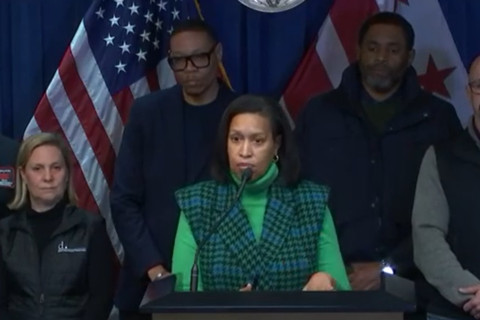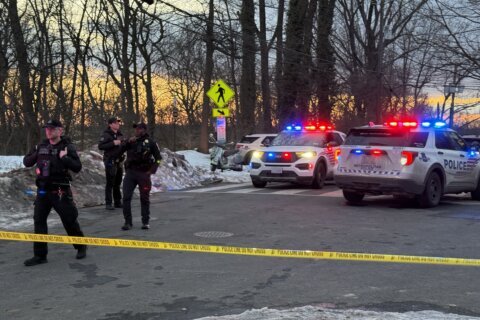The D.C. Council rejected Mayor Muriel Bowser’s veto and is moving forward with legislation to update the city’s criminal code, which hasn’t been updated for more than a century.
In a 12-1 vote — with Ward 8 Council member Trayon White voting in opposition — the council moved to override Bowser’s veto of the Revised Criminal Code Act.
Essentially, the city’s code determines what punishments to assign to crimes, including sentence lengths, and also classifies what types of crimes are misdemeanors. The code sets guidelines that the police, attorneys, courts, and prisons all work from.
Every council member, aside from White, spoke about their decisions to override the veto, acknowledging the 16 years of work and research by the Criminal Code Reform Commission to reflect the updated approaches to criminal justice.
Council member White said he plans to introduce amendments in the months ahead in hopes to further shape the new criminal code.
As longtime chair of the Judiciary and Public Safety Committee, Council member Charles Allen spoke about his effort to involve local neighborhood commissions, the U.S. Attorney’s Office for D.C., the attorney general’s office, the Public Defender Service and the D.C. police department.
“I made changes based on their concerns ranging from increasing criminal penalties for gun violence, maintaining criminal charges for public urination, and ensuring carjacking is a stand-alone offense with serious criminal consequences,” Allen said. “These are just some of the changes made based on the robust and healthy debate with the overwhelming majority of stakeholders that came to the table for years to develop a consensus modernization.”
Allen went on to say he was frustrated by the mayor’s decision to oppose the legislation, developed in partnership with the city’s top legal minds and the public’s input over three public meetings.
D.C. Council Chairman Phil Mendelson said he disagrees with the mayor’s rhetoric surrounding her opposition to the bill.
“The mayor and I get along on a lot of issues, and we’ve been working well on a lot of issues,” Mendelson said. “But on this one, I just have to say that it is irresponsible for the mayor to have characterized this as, ‘This bill does not make us safer.’ That is irresponsible rhetoric and it plays into folks like the Freedom Caucus in Congress who are going to use the mayor’s veto and her rhetoric against us. When this bill goes up to Congress, that is a problem.”
The new chair of the Judiciary and Public Safety Committee, Council member Brooke Pinto, noted that going forward, the public and criminal justice stakeholders will continue to have a voice.
“The new law will not go into effect for another three years, during which time I intend to fully explore whether additional amendments to the criminal code make sense,” Pinto said.
In a statement, Bowser said, “As elected leaders, we must take the fear and trauma of gun violence seriously by ensuring our criminal justice system is fair and functional and supports our top priority: keeping our community safe. That’s where my priority remains, and we will be sending legislation to the Council in the next 30 days that addresses the most concerning policies and weakened penalties included in the updated code.”
The mayor has previously said she’s concerned the measure overwhelm the District’s courts as the right to request a jury trial will be expanded in the new act.
However, six D.C. Superior Court judges were sworn in Tuesday, which is expected to help the courts sift through the hundreds of cases still needing to be heard due to a pandemic backlog.
Judge Carl “Zeke” Ross took the oath and has been sworn in by the Chief Judge. “It’s an honor to serve the people of the District of Columbia” the #DC native shared. Congratulations! pic.twitter.com/KibMkYwW5F
— District of Columbia Courts PIO (@DC_Courts) January 17, 2023
White, in opposition to the bill in its current state, said he has no doubt that the city’s more than 100-year-old criminal code is in need of updating. However, he said the city must emphasize resources and preventive measures to counter crime.
“I do think we need to have a greater focus and emphasis on preventive measures, which have not been a priority in the District,” he said.
Council member Christina Henderson supports the bill and understands the challenge of moving forward with the legislation when so many children are being affected by gun violence.
“Crimes and their respective penalties must be proportionate,” she said. “And I recognize that holding true to this principle while there is news of an incident involving gun violence each day can be conflicting.”
But she said the crime bill is “forward-looking,” adding, “As was mentioned earlier, the changes we approved last year will not impact the sentencing and the penalties for crimes committed now, nor does it impact law enforcement’s ability to do their work today.”
Other stakeholders in the criminal justice arena shared their reaction to the legislative move, including the D.C. Police Union.
“The Mayor is the only elected official listening to District residents on crime and violence,” said union president Gregg Pemberton in a statement. “This law, once enacted, will lead to violent crime rates exploding even more than they already have. It’s reprehensible that the Council would smugly continue to support failed policies at the expense of the lives of our most vulnerable residents.”
The law will take effect in October 2025.
WTOP’s Dick Uliano contributed to this report.








